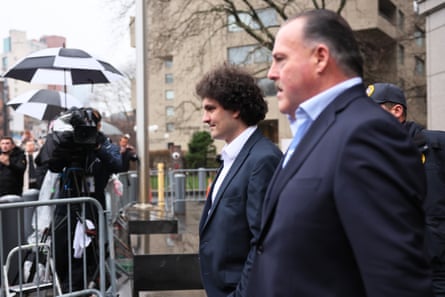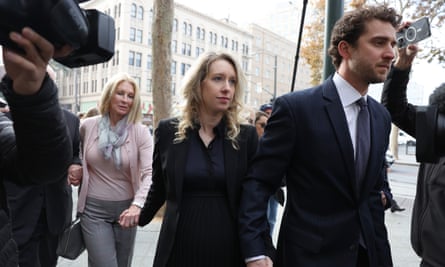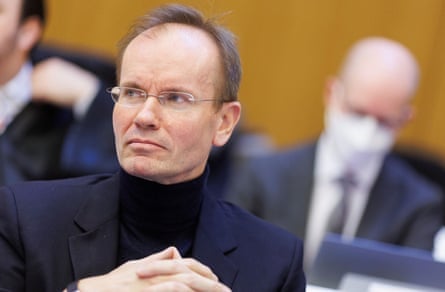FThe TX HQ, we now know, was not typical. CEO Sam Bankman-Fried ran his business out of a $40 million penthouse in the Bahamas called the orchid, complete with Venetian plaster walls and a grand piano. The lot was located next to a championship golf course and a mega-yacht marina. Since Amazon doesn’t ship to the Bahamas, private jets did the job.
It wasn’t your typical corporate headquarters, but FTX is not your typical corporation. It’s bankrupt, dragged down by its own financial abuses, and its CEO is facing jail time. However, while FTX has made headlines, its story is not as unusual as you might think.
I work in corporate investigation, and it’s my job to detect fraud and corruption. Sometimes it’s as subtle as manipulating your free cash flow. Sometimes it’s as shameless as Photoshopping your bank statements.
The work is varied. In general, I look for red flags: accounting abuses, yes, but also blatant business practices, such as failure to pay vendors. We want to answer the question: is the company doing what it says it is doing, at the level it should be? And if not, can that company really be worth what the market thinks it is worth?
I use various methods to do this. You might expect some (financial reports, local presentations, datasets), but not others, including social media. I was recently deep into the Instagram account of a CEO whose company we think is a house of cards. I long watched a snapshot of a family member, posing on the steps of a private jet with champagne and a gun. If I were to paint a portrait called “hubris”, it would go something like this.
Corruption and its consequence, fraud, have many origins. Sometimes executives like their jets and yachts a little too much. Or they may have connections to the mob or drug cartels. Or they may just make big promises that they can’t keep. Far from being an easy way out, fraud is a tightrope act, the rewards high, the penalties higher. So companies go to great lengths to hide it, threatening whistleblowers with death or planting tracking devices in short sellers’ cars.

But while the scammers I’ve encountered are generally smart, or at least cunning, sooner or later something interesting happens: They get carried away. Intoxicated by their own genius, they invent grander plans, more outlandish methods. They give large contracts to family members, who are themselves shareholders in the company. They fire their top-tier auditor and bring in a no-name firm. In the case of Sam Bankman-Fried, they are allegedly participating in a Signal group chat titled “Spare Fraud.”
The consequences of this arrogance can be catastrophic. Investors risk losing money, of course, but people risk losing their lives, too, perhaps because the company has made drastic cuts in the life-saving equipment it uses or sells, or cheated on its own tests. emissions (Volkswagen), or by pretending they can monitor cancer from blood samples (Theranos).
There is something unique in our era that encourages the charlatan. In addition to researching corporations, I’m also a novelist, and I believe we live in the age of the corporate fairy tale: a magical land of unicorns and everlasting growth. “Which is the history?Investors like to ask about the latest startup, wishing the narrative was true even as they live out the myth of their own utter rationality.
Elon Musk once said: “Brand is just a perception, and perception will match reality over time.” In other words, if the emperor believes that he is wearing wonderful clothes, others will start to believe it too. When I was doing research for my first novel, in which a tyrant’s wife stands trial for her husband’s corruption, I found someone else making a comment eerily similar to Musk’s. It was not from another business leader; It was Imelda Marcos. “The perception is real,” said the wife of the former Philippine dictator. “And the truth is not.”
unchecked power
One of my contacts met Elizabeth Holmes of Theranos at a time when investors were desperate to give her money. She couldn’t see how Theranos’s work was possible, she said. His company did not invest, but he was sidelined internally for missing out on news. By the time the company collapsed, vindicating his decision, he had left the company.
In another case, I spoke to a whistleblower who was the target of silent phone calls and phishing attacks. He also believed that he was being followed. Just before he was fired, they tried to send him on a business trip to a developing nation. He called his manager, who knew about his complaint. “He said if he left me, he wouldn’t come back.”

This type of behavior is only possible when those in power are allowed to run amok. “Never in my career have I seen such a complete failure of corporate controls,” John Ray III, FTX’s new chief executive, wrote in a bankruptcy court filing, while Ethereum co-founder Vitalik Buterin accused the company of to act like “1930”. dictators”. A dictator is, in a sense, the CEO of a country, and as the Silicon Valley cult of personality has grown and spread, the CEO has become a dictator.
Markus Braun, the former chief executive of Wirecard, Germany’s answer to PayPal, was a self-proclaimed visionary whose company collapsed spectacularly in 2020. He is on trial, while his chief operating officer is on Interpol’s most-wanted list. In 2019, Renault Nissan CEO Carlos Ghosn fled charges he was facing in Japan for smuggling out a case of musical instruments. I used to be a business reporter at Reuters and bankers would rave about his strongman tactics, how the company would collapse without him. The problem is that all too often these emperors turn out to have nothing on.
That’s not to say that fraud always starts deliberately. You’re a little short on a quarter, so you massage the numbers a bit, just to make things right. The next quarter you fall short again. You change the numbers again, but since a gap has already been opened, you have to do it a little more. Before you know it, you’re in too deep. You cannot come clean, because that would be confessing past sins. Your only option is to keep going, down the rabbit hole. People think that numbers cannot lie, but a company’s accounts are neither more nor less than a story made up of figures. Margins are inflated, funds back and forth. Black holes disappear.
Once you get on this path, it’s hard to stop. You need something to distract people from asking unwanted questions. The tools for this are often simpler than you might think: we are all susceptible to charm and its ugly sister, shit. The image, for example, is key. Theranos’s Holmes and Wirecard’s Braun preferred a black polo shirt: the echoes of Steve Jobs were deliberate. As Musk says, perception will match reality over time.
Except, of course, that’s not how the world works. Only a child or a madman believes that the fantasies in his head can come true. And such delusions are pierced so easily, if only exposed to the right questioning. Around the time that Enron began selling weather futures, an analyst set out to answer an absurdly simple question: “How does Enron make money from him?”

But it’s hard to ask the so-called stupid questions. I’ve lost count of the times I’ve heard executives mislead their own shareholders with complex or subtly nonsensical language. It takes force to push back. “Excuse me,” a gruff Scottish accent interrupted an earnings call, amid a sea of soft American tones. But nothing you say makes sense. I wanted to cheer up.
Are corporate wrongdoing on the rise? The statistics certainly suggest so. The latest annual report from the US Securities and Exchange Commission on its whistleblower program showed a record 12,210 tips were provided in 2021, a 76% increase over 2020, itself a record. The commission also awarded more financial awards to whistleblowers than in all previous years combined; in other words, the information provided was real and significant enough to have real consequences.
In recent years, low interest rates have caused an economic tide that has lifted all boats, no matter how leaky. But post-Covid, the macro environment is changing, and it is human nature that it is losses, rather than gains, that prompt us to ask questions. FTX may be a spectacular example, but it won’t be the last. As Warren Buffet once said: “Only when the tide goes out do you see who has been swimming naked”.
Freya Berry’s first novel, The dictator’s wife(Headline Review) is available February 2 in paperback, ebook and audio download






